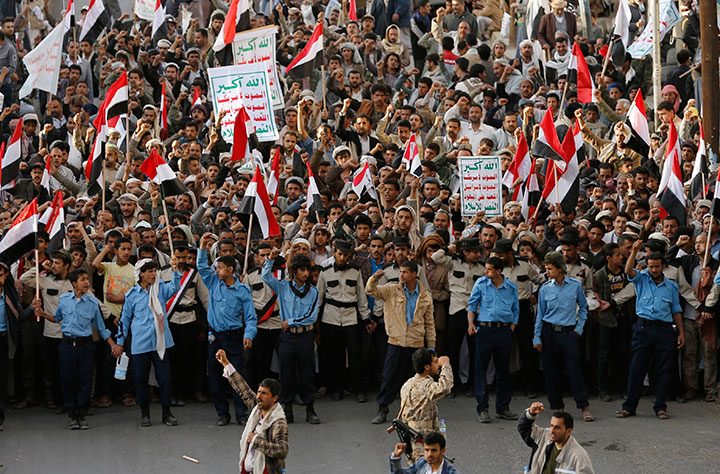
Shortly after the United Nations warned that the country of Yemen could enter a civil war and break apart soon, fighters linked to al-Qaida managed to seize a large army base in the southern part of that country.
According to Mohammad Mukhashaf of Reuters, the fighters managed to seize the base on Thursday, which housed a brigade of up to 2,000 Yemeni government soldiers, after several hours of heavy clashes. Ansar al-Sharia, a group affiliated with al-Qaida, claimed on Twitter that it detonated a suicide bomb and captured some of the troops.
"We believe the situation is very dangerous," U.N. Special Envoy to Yemen Jamal Benomar said in a TV interview. "Yemen is on the brink of civil war."
Benomar added that both sides have contributed to the turmoil. According to Reuters, he urged for more talks.
During a U.N. Security Council meeting, Secretary-General Ban Ki-moon placed Yemen's deterioration in stark terms, according to Rod Nordland and Shuaib Almosawa of the New York Times.
"Let me be clear," Ban said to the Council. "Yemen is collapsing before our eyes. We cannot stand by and watch."
According to the New York Times, Mark Lyall-Grant, the British ambassador to the U.N., told reporters that "we are looking for a resolution in the next few days." The U.N. Security Council had been discussing how to resolve Yemen's crisis with a draft resolution.
Back in Yemen, an official who refused to be identified told Reuters that residents feared that a clash would take place near the captured army base. Reuters noted that the Ansar al-Sharia fighters were of Sunni origin, while the Houthis were Shiite and backed by Iran.
"We are scared this (the capture of the army base) is going to be used as a justification for a Houthi attack and that they will take over Shabwa with the help of the army," the official said.
Col. Mubarak Abdullah, the former head of security for the Interior Ministry in Baihan District, confirmed to the New York Times that the base, which was the headquarters of the Yemeni army's 19th Brigade, fell to the militants. He added that the number of soldiers taken prisoner there remained unknown; however, the New York Times reported that 12 soldiers were killed in the attack, according to officials in that area.
"Given the shaky situation in the country, the fighting and defensive spirit is no longer with the people because they know no one will save them," a security official said.
The New York Times reported that Yemen's original government collapsed on Jan. 22, when the Houthis managed to get Yemeni president Abdu Rabbu Mansour to resign after they besieged his home.
Reuters reported that before its collapse, the United States supported Yemen's government in its war against al-Qaida, mostly through drone strikes on militants. However, due to the instability within the Middle Eastern country, the U.S., alongside the United Kingdom and France, closed their embassies in Yemen's capital, Sanaa, on Wednesday.
















